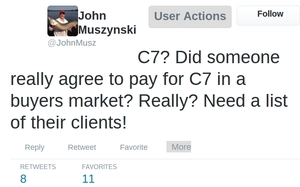Some Networks, GroupM Move To C7 Ratings
- by Wayne Friedman , June 2, 2014

Although big media agency GroupM may be moving to C7 rating from C3, other media agencies, as well as some movie studios, might not follow -- at least for this upfront season.
For all its national TV advertiser clients, GroupM is switching its upfront rating guarantees to the average commercial ratings plus seven days of time-shifted data, C7 --
from three days of time-shifted viewing (C3) according to a number of media executives.
C3 has been the industry's virtual “currency”
since 2007 for all national TV networks.
Fox and CBS would only confirm they have made a preliminary deal with a major media agency to move to C7 from C3. NBC and ABC had no comment. Group M executives did not respond by press time.
advertisement
advertisement
Media executives were careful to note the shift to C7 does not mean actual upfront deals were contracted by GroupM -- only that these preliminary deal points were agreed to. GroupM represents anywhere from 25% to 30% of all TV media buying, according to some estimates.
Back in 2007, GroupM led the way in pushing for a similar change to C3 rating guarantees from live program guarantees. Virtually all other agencies and clients agreed to link their upfront deals for the 2007-2008 season to C3.
But unlike seven years ago, this GroupM move to C7 may not expand
to a wholesale industry change to a new rating guarantee metric. Media agency executives, such as from big media agency, Starcom MediaVest Group, have said it would be unlikely upfront deals would
change to the C7 metric this year. In response to the news from GroupM today, John Muszynski, chief investment officer of Starcom MediaVest Group's Spark, tweeted: "C7? Did someone really agree to pay
for C7 in a buyers market? Really? Need a list of their clients!" (see screen shot below).
Other media executives say neither of Omnicom Media Group's PHD or OMD USA agencies are working on
C7-linked upfront deals currently.
Many media executives believe that in making deals using C7, GroupM is looking to extract better pricing heading into this upfront period -- which, according to estimates, is poised to be a weaker market with cost-per-thousand viewer pricing (CPMs) anywhere from 4% to 7% above a year ago.
While TV executives such as Les Moonves, president/chief executive officer of CBS Corp., have been predicting a move to C7 for some time, other executives believe this is only an intermediate step when it comes to guaranteeing viewership -- that ultimately it needs to include all viewing on all TV-video screens.
Clients such as movie studios and retailers continue to be leery about paying seven days of TV ratings guaranteed over such a long time period -- especially when many have short-term, near-term weekend promotion creative. But media executives says lower price points could alter their opinions.
Starting around two years ago, a handful of individual advertiser C7 metric TV deals have been made across a number of TV broadcast networks.
Steve McClellan
contributed to this story.



7 days to cume an audience?
not just movie studios, try all short term transaction businesses aka ALL retail: QSR, banking, big box, specialty, grocery, bedding, automotive...
someone's trying to put the "magic" back into the business...
When the agencies contend that a seven delayed audience "count" is not what they need due to the "timeliness" of their commercial messages, one has to laugh. The same shops don't mind it a bit if 20% of their media dollars are spent in magazines whose audiences take months to accumulate. But when it comes to TV---and we're talking only about primetime broadcast network shows, plus a few cable entries, not all of TV---they get all hot and bothered if an extra few audience percentage points get added via the delayed viewing process from 4-7 days after the show aired. Sorry folks, I'm not buying it. Even if you think that millions of viewers will respond by rushing out of their homes 1-3 days after "exposure" to your commercial, while those who "see" the message 4-7 days later won't ( an absurdity in itself ), doesn't anyone realize that they are running campaigns, not just individual spots. The effects of their schedules overlap and develop momentum over time. Somebody who "sees" your commercial one day after the episode aired, may also have seen the same message five days earlier or is just about to see it again, tonight----in both cases, on different telecasts. All of these exposures have their effects.